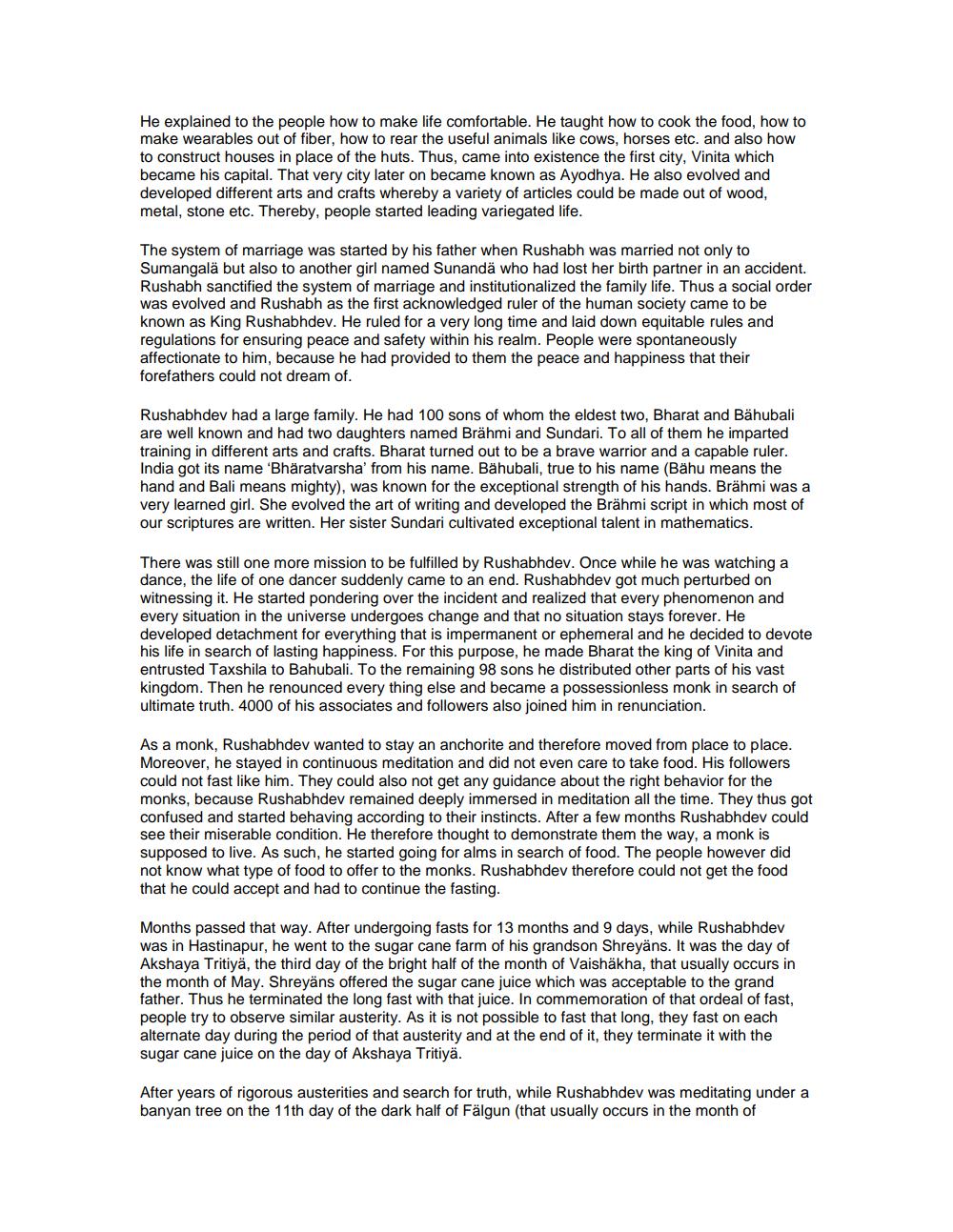Book Title: Jain Story Book Author(s): Manu Doshi Publisher: Manu Doshi View full book textPage 5
________________ He explained to the people how to make life comfortable. He taught how to cook the food, how to make wearables out of fiber, how to rear the useful animals like cows, horses etc. and also how to construct houses in place of the huts. Thus, came into existence the first city, Vinita which became his capital. That very city later on became known as Ayodhya. He also evolved and developed different arts and crafts whereby a variety of articles could be made out of wood, metal, stone etc. Thereby, people started leading variegated life. The system of marriage was started by his father when Rushabh was married not only to Sumangalä but also to another girl named Sunandä who had lost her birth partner in an accident. Rushabh sanctified the system of marriage and institutionalized the family life. Thus a social order was evolved and Rushabh as the first acknowledged ruler of the human society came to be known as King Rushabhdev. He ruled for a very long time and laid down equitable rules and regulations for ensuring peace and safety within his realm. People were spontaneously affectionate to him, because he had provided to them the peace and happiness that their forefathers could not dream of. Rushabhdev had a large family. He had 100 sons of whom the eldest two, Bharat and Bahubali are well known and had two daughters named Brähmi and Sundari. To all of them he imparted training in different arts and crafts. Bharat turned out to be a brave warrior and a capable ruler. India got its name 'Bhäratvarsha' from his name. Bähubali, true to his name (Bahu means the hand and Bali means mighty), was known for the exceptional strength of his hands. Brähmi was a very learned girl. She evolved the art of writing and developed the Brähmi script in which most of our scriptures are written. Her sister Sundari cultivated exceptional talent in mathematics. There was still one more mission to be fulfilled by Rushabhdev. Once while he was watching a dance, the life of one dancer suddenly came to an end. Rushabhdev got much perturbed on witnessing it. He started pondering over the incident and realized that every phenomenon and every situation in the universe undergoes change and that no situation stays forever. He developed detachment for everything that is impermanent or ephemeral and he decided to devote his life in search of lasting happiness. For this purpose, he made Bharat the king of Vinita and entrusted Taxshila to Bahubali. To the remaining 98 sons he distributed other parts of his vast kingdom. Then he renounced every thing else and became a possessionless monk in search of ultimate truth. 4000 of his associates and followers also joined him in renunciation. As a monk, Rushabhdev wanted to stay an anchorite and therefore moved from place to place. Moreover, he stayed in continuous meditation and did not even care to take food. His followers could not fast like him. They could also not get any guidance about the right behavior for the monks, because Rushabhdev remained deeply immersed in meditation all the time. They thus got confused and started behaving according to their instincts. After a few months Rushabhdev could see their miserable condition. He therefore thought to demonstrate them the way, a monk is supposed to live. As such, he started going for alms in search of food. The people however did not know what type of food to offer to the monks. Rushabhdev therefore could not get the food that he could accept and had to continue the fasting. Months passed that way. After undergoing fasts for 13 months and 9 days, while Rushabhdev was in Hastinapur, he went to the sugar cane farm of his grandson Shreyans. It was the day of Akshaya Tritiya, the third day of the bright half of the month of Vaishäkha, that usually occurs in the month of May. Shreyans offered the sugar cane juice which was acceptable to the grand father. Thus he terminated the long fast with that juice. In commemoration of that ordeal of fast, people try to observe similar austerity. As it is not possible to fast that long, they fast on each alternate day during the period of that austerity and at the end of it, they terminate it with the sugar cane juice on the day of Akshaya Tritiya. After years of rigorous austerities and search for truth, while Rushabhdev was meditating under a banyan tree on the 11th day of the dark half of Fälgun (that usually occurs in the month ofPage Navigation
1 ... 3 4 5 6 7 8 9 10 11 12 13 14 15 16 17 18 19 20 21 22 23 24 25 26 27 28 29 30 31 32 33 34 35 36 37 38 39 40 41 42 43 44 45 46 47 48 49 50 51 52 ... 90
